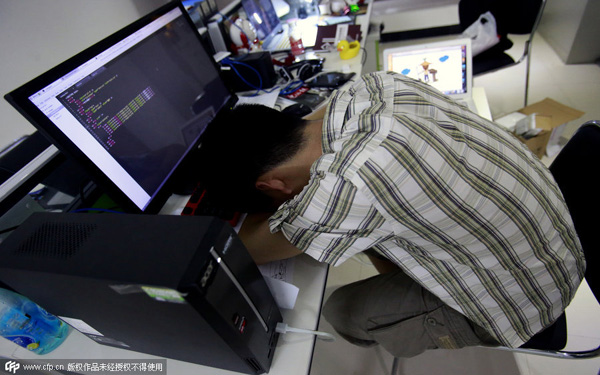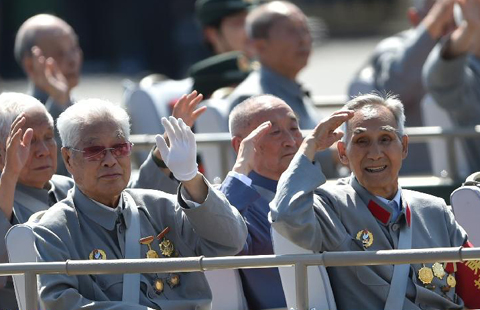Overtime is norm for white-collar workers
Updated: 2015-08-28 07:51
By Su Zhou(China Daily)
|
||||||||
 |
|
A software developer takes a break in his office in Wuhan, Central China's Hubei province, April 28, 2015. [Photo/CFP] |
Working overtime has become routine for white-collar workers, with more than 60 percent of employees in a recent survey saying they have to work extra time on weekdays and 40 percent having to do so on the weekends.
Nearly 14 percent said they only enjoyed half the weekends off in a month, while 3.4 percent said they had no day off in a month.
The survey was released by leading portal website NetEase. It was based on data from 800 million users as well as results from more than 38,000 questionnaires. Work outside of the 9 am to 6 pm time frame was defined as working overtime.
Guangdong province, Beijing and Zhejiang province have the most employees working extra time from Monday to Friday, while Hong Kong, Shanghai and Jiangsu province have the highest average number of monthly overtime days.
Working such long hours can be harmful to employee health.
Zhaopin, a Chinese human resource website, said in a report that 56.6 percent of white-collar workers have no time to exercise.
Huang Ruoshan, Zhaopin's senior career consultant, said working overtime is only prevalent in certain industries such as real estate, the Internet and finance.
"Those industries are developing very rapidly, which demands employees work hard under pressure and work extra time," said Huang. "Take the e-commerce industry as an example: It actually demands that employees be available 24 hours a day seven days a week."
In the Internet field, there is a term called "996", which means employees start at 9 am, finish around 9 pm and have to work on Saturday.
An employee of mobile phone company Oppo in Shenzhen who only wanted to be identified as Shen, said it is normal to work extra time and he is willing to do that.
"I barely have weekends. However, I am satisfied with my job, my colleagues and working environment. This industry is changing so fast, I am proud to say I am creating value in my position," said Shen, 27.
"However, I know working overtime hurts my health. I even look older than my peers," added Shen. "So I am considering an early retirement when I have enough savings."
According to a report released by Zhaopin in February, getting out of Beijing, Shanghai and Guangzhou has become more popular, with more job seekers considering moving to smaller cities.
Huang, the career consultant, said pressure from hard work and the fast pace of life have driven some job seekers away from first-tier cities.
"Employers have figured out how to keep talent under high pressure," said Huang. "Certain companies provide canteens, exercise facilities and other convenient services. Job seekers can't change the workload, but have to make their choices based on the situation."
- From the office to the ring, White Collar Boxing is now a reality show
- White-collar war zone
- Top 10 highest-paid white-collar jobs in China
- Via apps, freelance workers earn more than white-collar professionals
- Nearly half of white-collar workers may quit over year-end bonus
- White-collar workers give jobs a low score
- Three killed, 8 missing after fishing boat capsizing in S.Korea
- Migration crisis tears at EU's cohesion and tarnishes its image
- Britain signals move towards air strikes in Syria
- Snowden accepts Norwegian prize via video link
- Tokyo ditches Olympic logo amid new plagiarism allegation
- Japan criticized for protest over UN chief's visit to Beijing

 50th anniversary of Tibet autonomous region
50th anniversary of Tibet autonomous region
 Red carpet looks at the 72nd Venice Film Festival
Red carpet looks at the 72nd Venice Film Festival
 China beats Russia in 4 sets at volleyball World Cup
China beats Russia in 4 sets at volleyball World Cup
 8th Int'l Military Music Festival 'Spasskaya Tower' begins
8th Int'l Military Music Festival 'Spasskaya Tower' begins
 Downpour floods streets in Beijing
Downpour floods streets in Beijing
 Veterans attend V-Day anniversary gala show
Veterans attend V-Day anniversary gala show
 Military helicopters write number 70 high in the sky
Military helicopters write number 70 high in the sky
 Salute to veterans
Salute to veterans
Most Viewed
Editor's Picks

|

|

|

|

|

|
Today's Top News
Austria, Germany open borders to migrants
Central government steps up economic support for Tibet
China economy enters 'new normal' eyeing 7% growth rate: G20
Troop cuts signal path of peaceful development
Sino-Russian investment fund eyes more deals
Predicting Internet's future without a crystal ball
Silk Road Fund to expand ties with lenders
Intl community echoes Xi's speech at V-Day commemoration
US Weekly

|

|







